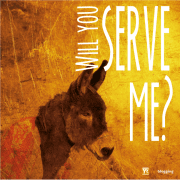How to Be Childlike Before God
The other night after small group, I experienced the cutest thing all week: The daughter of one of our members, who reminds me of a blonde, blue-eyed version of Boo from Monsters Inc.
Our host had The Most Patient Cat in the World, who allowed “Boo” to touch all of his main body parts, exclaiming in her sweet little voice as she went: “TAIL!” “EYES!” “FACE!” about 546 times. We watched them for an entire half hour.
“Boo” was delightful, and chock-full of sheer happiness. She was adorably undignified, openly affectionate.
I’ve been thinking about how God wants—no, actually, requires that we somehow go to Him like her.
I’ve heard a lot of speculation about childlike faith. Some of it has been proven false by my personal experience of motherhood (Trust me, kids are not completely “innocent”). But I do believe Boo felt no need to pretend or posture, even if she needed a diaper change. She had every reason to trust in and depend on her parents as they scooped her up to make sure she got to bed at a time that was healthy for her. And she brought her whole, disarmed and disarming self.
The opposite of being childlike is…
A pastor pointed out to me one time that in Mark 10, there may be a distinct logic behind the ordering of the stories there.
Mark begins with the narrative of Jesus welcoming the little children. From verse 13, we see Jesus is “indignant” with his disciples who kept kids from coming to him. Kids were people of no status; like Boo, little to contribute to society except a mouth to feed.
Yet Jesus throws everybody off with his black-and-white comment: “the kingdom of God belongs to such as these. Truly I tell you, anyone who will not receive the kingdom of God like a little child will never enter it” (vv. 14-15).
Yet right after that, Mark presents the story is of a rich, young ruler who’s seeking Jesus genuinely; he runs up and kneels at the feet of Jesus, wanting to know what to do to gain eternal life. And Jesus isolates the one thing the guy can’t let go of: his wealth, and presumably all the standing and favour it affords him.
As the man walks away in sorrow, Jesus remarks, “It is easier for a camel to go through the eye of a needle than for a rich person to enter the kingdom of God…” (v. 25, emphasis mine).
I reckon most of us read this and wonder, does God have something against rich people? I see rich people in the Bible, like Abraham, Job, David, who were loved by God. Yet what is it about wealth that makes loving God unlikely (James 5:1-3, Proverbs 11:28, Psalm 52:7)? And why did Jesus contrast this with. . . kids?
I’ve spent some time thinking on it, with guidance from my pastor-friend and other scriptures (Luke 12:16-21, 16:14, Revelation 3:17), and here’s what I’ve come up with:
| Coming to God as a child (Matthew 5:3) | Coming as rich |
| In need | Self-sufficient |
| Helpless, dependent | Self-sustaining; looking to what you’ve done or “deserve” as safety nets |
| Affectionate; no reserve | Reserved, perhaps even sceptical |
| Humble; no resume of achievements | Subconsciously listing accomplishments as marks of worthiness; self-righteous |
| Coming as you are, trusting you’ll be accepted | Bringing what you have as “leverage” |
Some of my own symptoms of coming as “rich”? Perhaps my buttoned-up style of worship, lest like David, I become “undignified” (2 Samuel 6:22). Or when I’m suffering, presenting to God my spiritual resume of accomplishments and faithfulness to imply, “Don’t I deserve better than this?”.
Rather than counting all things as less—loss—compared to knowing Jesus (Philippians 3:7-8), I come to God with all I have to offer, sometimes even thinking how glad God must be to have me on His team.
But what if, instead, I brought my work to God with Boo’s enthusiasm and guilelessness, anticipating His delight and not a “boost” in my status? What if I couldn’t wait to share my emotions with Him, whether weeping or overjoyed, climbing onto His lap as my Abba?
Would my relationships look different if I never needed to prove myself, or set things to rights when undervalued, or engineer conversations to evoke praise?
Not rich, just. . . middle class?
Tim Keller spoke in his insightful podcast about what it means to be poor in spirit, and how those of us who aren’t poor can end up bringing a “middle class” mindset to our spirituality:
[Poor in spirit] means seeing that you are deeply in debt before God, and you have no ability to even begin to redeem yourself. God’s free generosity to you, at infinite cost to Him, was the only thing that saved you.
On the contrary, [being middle class in spirit means] You believe that God owes you some things—He ought to answer your prayers and to bless you for the many good things you’ve done. . . You feel that you’ve earned a certain standing with God through your hard work. You also may believe that the success and the resources you have are primarily due to your own industry and energy.
Perhaps we’re middle-class in our approach to problems, assuming God helps those who help themselves. So our anxiety or healing from illness must require more faith, more fasting, more buckling down.
While, yes, God may sometimes ask that of us, the bigger question is, where do we place our hope—in our efforts, or in God? Is God our cosmic vending machine, asking us to just deposit enough change?
I still sense a subtle entitlement in me sometimes, even after serving in Africa. As if doing something sacrificial for God earned me a better standing, a right to be heard and answered as I wished. I wasn’t always going to God with Jesus’s merits; I brought my own.
Maybe you’ve already picked up on this, but I see a direct tie to the Gospel here. Am I truly speaking over myself a pure Gospel, where it is only by grace I’ve been saved, not as the result of what I do (Ephesians 2:8-9)?
It’s His work, His unabashed love that’s taken me out of my daily courtroom (“Prove yourself!”) and ushered me into the freedom that begins from spiritual poverty. He speaks “Beloved” over my insecurities, settles my grasping heart in relationships and accomplishments, and purifies my service.
Perhaps instead, I could take a page from Boo’s playbook—to simply delight and say, “JESUS!”
This was originally published on the author’s blog here. This version has been edited by YMI.
















Leave a Reply
Want to join the discussion?Feel free to contribute!